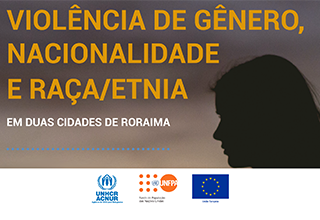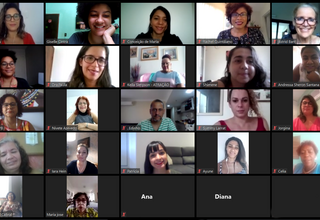On the occasion of 16 Days of Activism against Gender-based Violence and Human Rights Day, UNFPA Brazil launches a series of reports about violence against women and girls as barriers to the promotion of rights
December 10, 2019, Salvador, Bahia, Brazil - Women around the world have been facing challenges in ending gender-based violence. The murder of 25-year-old Elitânia de Souza Hora shows how much more needs to be done.
The State of World Population Report 2019 (SWOP), launched globally by the United Nations Population Fund (UNFPA) and entitled Unfinished Business: the pursuit of Rights and Choices for All, emphasizes that to achieve development, gender-based violence needs to be addressed. For example, the report shows that integrated health services, social assistance, psychosocial care and employment are needed to support women in their autonomy and other needs to live safely.
In Brazil there are many public policies aimed at addressing the various forms of violence against women. However, the country still has high rates of aggression and femicide cases. According to data from the 13th Edition of the Brazilian Public Security Yearbook of the Brazilian Public Security Forum, in 2018, 1,206 women were victims of femicide, 61% of black women and 52.3% of firearm murders. In 88.8% of the cases, the perpetrator was the victim's former partner.
On November 27, Elitânia de Souza Hora, 25, a social work student, was violently killed by gunfire, in spite of a restraining order, in a suspected case of femicide, in Salvador-Bahia (Brazil) UNFPA Brazil and UN Women issued a public note repudiating the murder and recurring cases of violence against women in Brazil. This crime, and the many femicides that robbed women of ther lives that came before, show us how urgent is to intensify efforts and invest in prevention of violence against women."
Types of violence and femicide
According to Bahia State Representative Olivia Santana, Brazil has one of the best laws in the world, but it needs to be implemented. “The law need to work! And that can only happen if the justice system is working for women, ” Olivia Santana emphasizes in criticizing what he calls “male supremacy over women.”
“It's hate. Violence against women originates from a patriarchal ideology. The woman dies because she is a woman and suffers all kinds of aggression (symbolic, psychological, physical, moral) until it reaches the point of being lethal, which takes her life. ” The chairwoman of the Women's Rights Commission of the Legislative Assembly of Bahia also emphasizes that all issues regarding gender-based violence permeate one key element: freedom.
“Violence against women is a hindrance to freedom, autonomy and sexual and reproductive rights. How can a woman who suffers persecution, violence, machismo take the attitude of knowing how to plan her family, to be able to define when she will have a child, or how many children she will have and if she will have? If you have the right to say you don't want to get pregnant, or have access to contraceptive methods?”, she questions.
According to Maria Jose de Oliveira Araújo, from the Feminist Health Network, the Global Doctors for Choice Brazil and the Working Group on Femicide, women who suffer permanent violence have low self-esteem, do not seek health services, they do not are prevented from STIs (Sexually Transmitted Infections), they do not use contraceptive methods and, if pregnant, the number of prenatal consultations is lower. "There is also the issue of mental health, especially of adolescents who commit suicide because of domestic violence, especially when pregnant with the aggressor, especially when being family," she says.
The activist and psychoanalyst also shares that there is no consensus on the definition of the term “femicide”, which may be femicide or femigenocide and that changing the current scenario requires a change in the instruments to combat violence. "We need the Maria da Penha Law to be fulfilled, We need women's police stations and shelters to function properly and public agencies to be mainly on the periphery."
The geriatrician and current secretary of policies for women in the state of Bahia (SPM-BA), Julieta Palmeira, emphasizes that the legal frameworks of the Maria da Penha Law, from 2006, and the Feminicide Law, from 2015, explain feminicide as the death of women due to their female gender. “One of the frequent violations is intimate femicide perpetrated by people closest to the victim. But it also happens in situations of human trafficking, in a situation of contempt or in situations of discrimination for the condition of being a woman. ”.
The Secretary of policies for women in the state of Bahia has several campaigns to alert the population about gender violence, such as campaigns Respect Mines and Toxic Masculinity - Strategies the Secretariat shares with UNFPA. “It is up to the woman to decide to give birth, but that is not what we see. There is harassment and rape culture. There are marriages determined by parents and/or teenage pregnancy. Issues that alert us about the need to guarantee sexual and reproductive rights throughout life cycles. Lack of information and economic determinants and social lead to violation of rights, ” she concludes.
How to report
- Report violence in specialized police stations. If you do not have in the territory, seek a common police station. The report can also be made by the number 180;
- Women can look for Reference Centers that provide multiprofessional care. If you do not have in the territory, seek the Reference Centers of Social Assistance;
- Women in towns and villages should report them to a mobile Unit for Assistance to Women in Situations of Violence.
By Midiã Noelle




